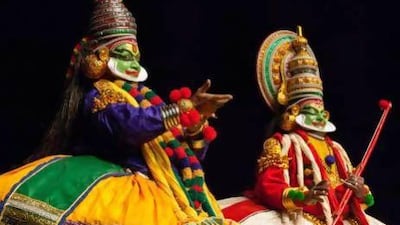The colour and sheer drama of Kerala's traditional theatre-dance kathakali, the rich repertoire of koodiyattam, the oldest surviving Sanskrit theatre, and a high-octane percussion ensemble - an unparalleled cultural feast showcasing Kerala's ancient art forms enlivened Dubai this past weekend.
The four-day International Koodiyattam and Kathakali Festival lived up to what it promised - exotic art at its finest. Organised by Thiranottam, a fraternity of art lovers working to promote Kerala's performing arts, the festival, held at the GEMS Wellington International School, coincided with National Day and celebrated the country's multicultural fabric.
The sixth edition of the festival kicked off on Thursday with a power-packed thayambaka, a percussion ensemble featuring the popular Kerala drum called the chenda and huge cymbals called elathalam. The chenda artists Kalpathy Balakrishnan and Kalanilayam Udayan Nampoothiri worked magic on the drums and enthralled the audience by playing complex rhythms.
Each day of the festival was a tribute to the legends who have contributed immensely to Kerala's arts. The first day was in memory of David Bolland, a Briton who was a pioneer in documenting live performances of kathakali and kooodiyattam. His award-winning short film Malabar Masque was screened as a tribute.
Then the beats of the maddalam, a drum slung around the hips, were heard, signalling the start of a kathakali performance. The audience was transported into a surreal world of gods, mythological kings and beautiful princesses. The first act told the story of a poor Brahmin complaining to the lord Krishna about the death of his eight newborns. Kotakkal Chandrasekhara Warrier, a maestro of the dance form, played the grief-stricken Brahmin to the hilt.
The festival followed a well-planned schedule, starting at 9am with sopana saangeetham, a style of classical music sung as accompaniment to kathakali, followed by koodiyattam, a lecture demonstration, two kathakali performances and ending with a thayambaka.
The koodiyattam performances were by far the most enriching. Koodiyattam is the oldest surviving Sanskrit theatre and has been proclaimed by Unesco as part of the Oral and Intangible Heritage of Humanity. It is often considered a precursor to kathakali.
The stylised acting, the use of Sanskrit verses as dialogue and its extensive gestural vocabulary were beautifully brought forth by Margi Sajeev Narayana Chakyar and the young Sanjeev Nambiar.
Nambiar earned high praise for his lithe footwork and portrayal of Raavana, the demon king, his abhinaya or facial expressions being the highlight of day two. Chakyar took on the mantle of Raavana the next day, displaying his proficiency in Sanskrit and his amazing expressions of disbelief and disgust that a monkey had dared to destroy his prized garden.
Chakyar enthralled the audience on the last day as the vidushakan, the narrator or court jester. His satirical delivery and expressions mimicking or ridiculing mythological characters were priceless - almost as amazing as his ability to speak almost extempore for nearly three hours.
Kathakali took up the greater part of each day, including lectures where the artistes demonstrated parts of a play through steps and expressions while KB Raj Anand, a kathakali connoisseur, explained the subtle nuances and the emotions highlighted in the story.
Sadanam Krishnankutty, 70, a renowned exponent of kathakali, enacted roles high on energy. Playing the monkey god Hanuman in a white billowing costume, red face paint and white headgear, Krishnankutty jumped from one corner of the stage to another, monkeying around and destroying Raavana's garden. Jumping apart, the act involved facial expression and complex footwork. The children in the audience couldn't have asked for more. His portrayal of prince Arjuna and the monkey king Baali were equally grand.
On the third day, Chandrasekhara Warrier got beneath the skin of the evil, lecherous king Keechaka. The veteran, in his late 60s, also played a magnificent Kaatalan, the hunter form taken by lord Shiva to teach Arjuna a lesson. The fight between the two briefly turned the stage into a charged, mini battleground.
The male characters always get the most attention in kathakali, partly owing to their larger-than-life roles and grandiose costumes. But Kalamandalam Rajasekharan left an indelible mark as the female protagonist. His enactment of the demoness Poothana had fans enraptured, especially her dramatic death at the hand of baby Krishna.
The thayamabaka at the end of each day provided the perfect, exhilarating finish, with Balakrishnan emerging as the star of the percussion ensemble. Along with Kalloor Unnikrishnan, he played his heart out on the chenda. As he wove intricate patterns on the drums, the crowd reached a rhythmic frenzy. Balakrishnan deftly took the festival to its climax and the audience left intoxicated by the rhythms.

